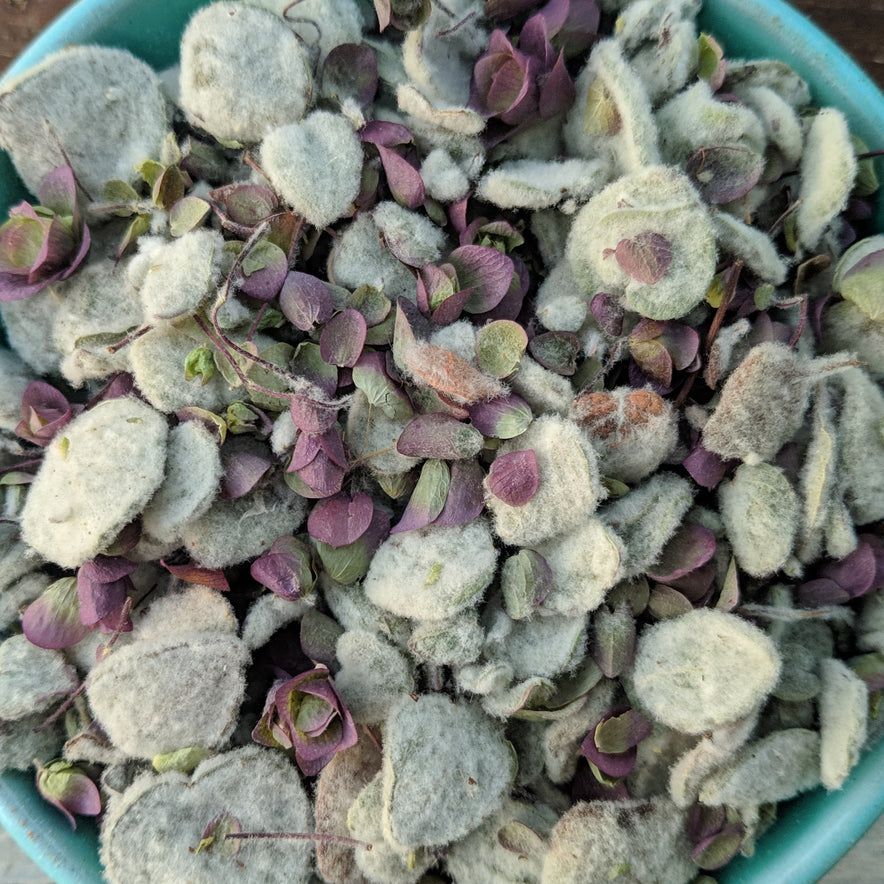
Cretan Dittany | Organic (Origanum Dictamnus)
Origanum dictamnus, also known as dictamnus creticus, diktamo, erondas, hop marjoram, and winter sweet, is a small shrub found only in the rocky mountainous regions of the island of Crete in Greece. This little lanate shrub is easily identified by the soft, woolly coating of white-grey hair on its stems, round green leaves, and tiny rose-pink flowers surrounded by brighter purple-pink ones, adding a splash of color to the plant.
Cretan dittany has traditionally been highly valued; it is related to marjoram and oregano and is harvested in the summer months for use in medicines, perfumes, and flavored drinks such as vermouth and absinthe. It has a rich herbal scent, gently spicy and mountainous, reminiscent almost of a wild and deep oregano smell while having at the same time quite floral and earthy notes.
In Ancient Greece, Hippocrates prescribed this plant to aid all manner of ailments, and considered the dittany of Crete useful for stomach aches and complaints of the digestive system and as a poultice for healing wounds, as well as inducing menstruation. Even "Harry Potter," the most renowned "magician" of children's books and movies, utilized it to cure the wounds of the series' protagonists.
In the Cretan dialect, it is also known as erontas (love in Greek), said to symbolize love and to be an aphrodisiac. According to folklore, only young men, also known as "erontades" (love-seekers), who were truly in love would dare to climb Crete's mountainsides and deep gorges to gather dittany flowers to offer as love tokens.
Known for its healing properties, it has strong antioxidant effects, which are linked to preventing cardiovascular conditions and combating free radicals. Dittany has antibacterial, antifungal, and antimicrobial properties due to the powerful compound carvacrol, which makes it excellent for treating symptoms of the common cold. It is used for digestive tract disorders including cramps, stomach problems, and worms in the intestines, as well as for urinary tract infections, headaches, epilepsy, spasms, fluid retention, and liver diseases.
Dittany not only eliminates harmful bacteria in the oral cavity, but it may also fight pathogenic fungi such as Candida. Dittany can also be used as a poultice for wounds and bruises.
Today, the wild, naturally grown dittany of Crete is classed as "rare" and is protected by European law so it does not become extinct.
Recommended Dosage
◉ 1-3 teaspoons of loose tea (or 3g up to 3 times) daily. If more than one herbal mixture is consumed at the same period of time, reduce the amount of tea accordingly.
◉ When herbs are used for an extended period of time, it is suggested to consume a herbal remedy with a ratio of 3 to 1. For example:
- If you choose to take it for 3 weeks, have a one-week pause.
- If it is taken for a 30-day period, have a 10-day pause.
That does not apply to herbs and fruits that have a laxative effect.
Notes
◉ Should be stored in airtight glass containers -in a cool, dark, and dry place- to preserve the flavor, texture, and properties.
◉ Before adding a new herbal remedy or supplement to your daily routine, you should consult with a medical doctor or holistic health practitioner.
Herbal Tea Brewing Instructions
- Heat the water to just the point when it starts to boil.
- Add 1 teaspoon of loose tea, to a tea infuser or tea bag, for every 180ml - 240ml of water.
- Pour the heated water (right off the boil) over the tea, cover your cup, and steep for 7-10 minutes or longer.
- Add honey or stevia for sweetness, if desired.
Follow these additional steps to make the perfect cup of tea!
